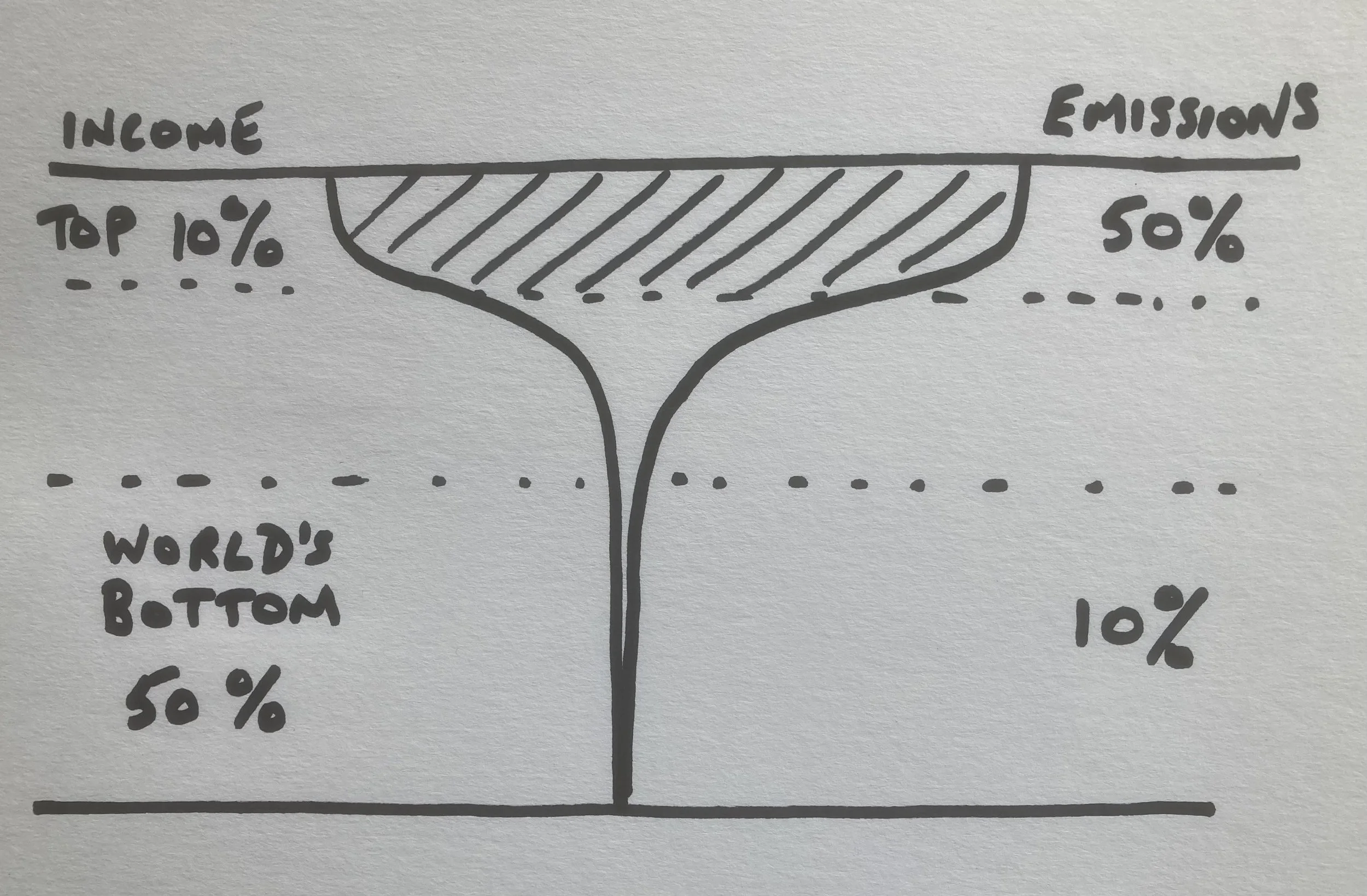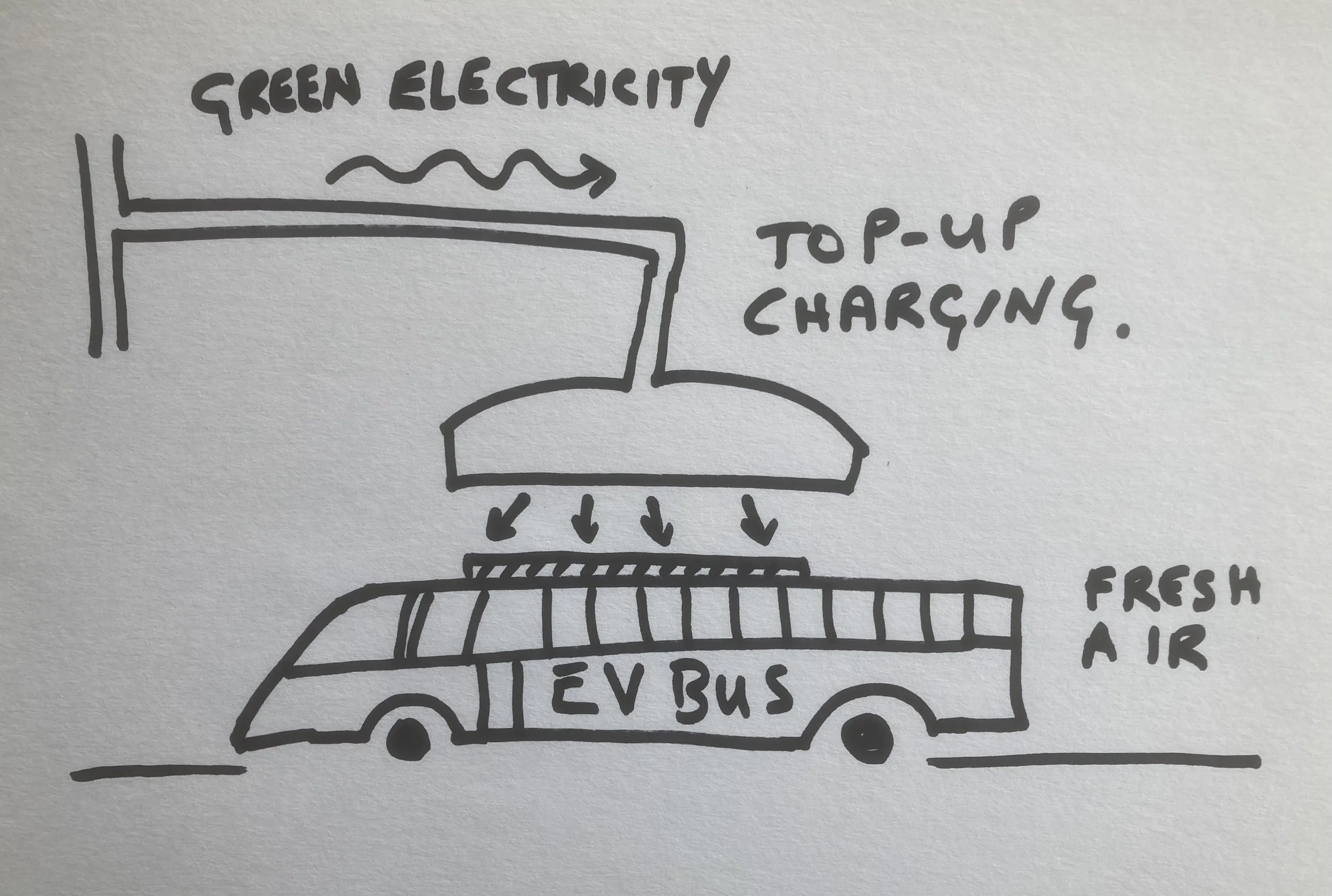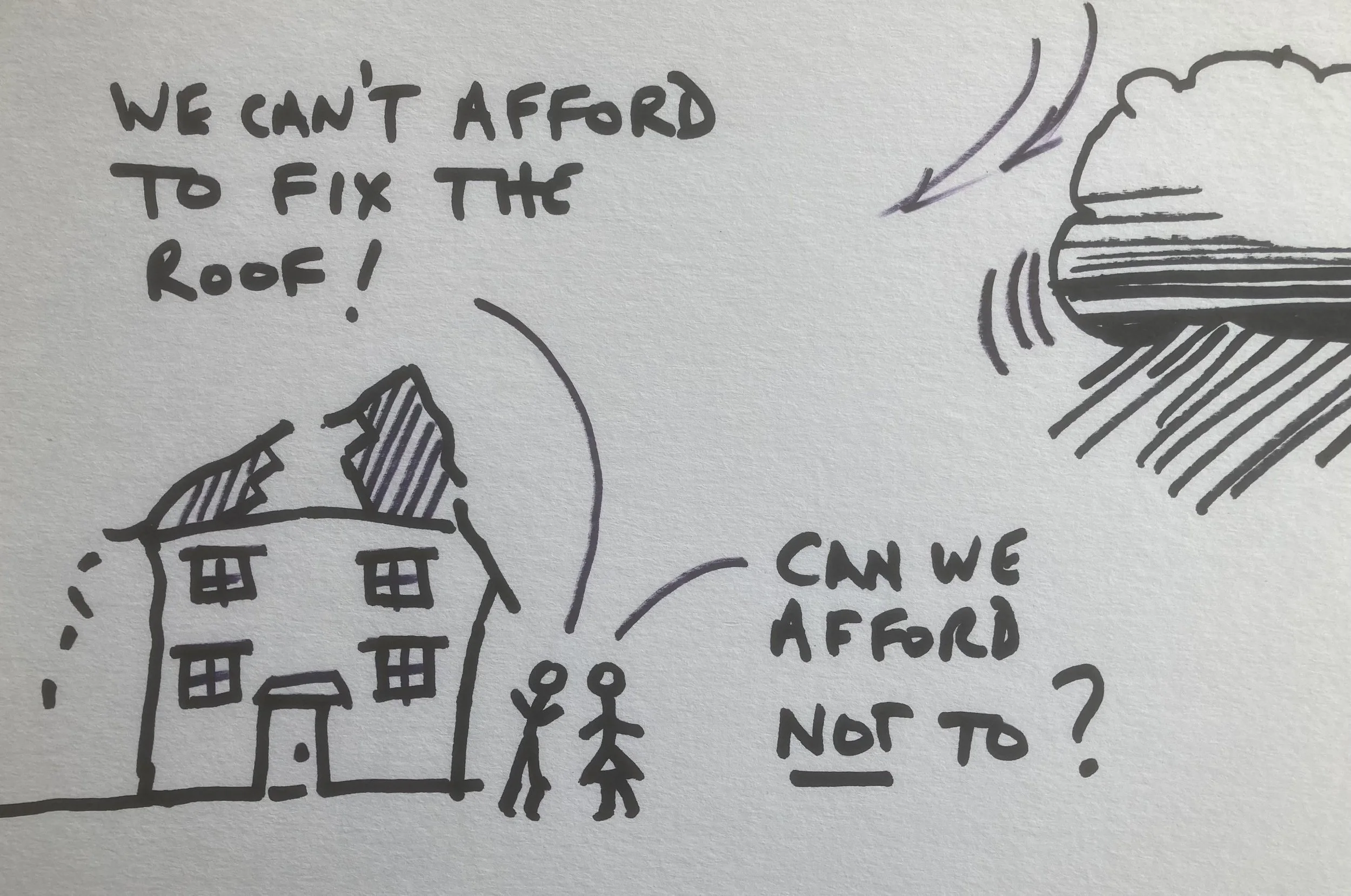How to talk about climate change
Pssst! You don’t have to be an expert!

Do you find it difficult discussing climate change?
There is not much that you need to know to get a basic understanding of climate change
For those wanting to explore various topics further, such as understanding our local carbon footprint.
Below are 10 questions that often get raised, questioning the seriousness of climate change and of solutions to address it. Each has a plain English answer that requires no scientific background. You can scroll through them using the left and right arrows.
For those that want to dig deeper into these questions, see the references cited in the text e.g. [1] refers to reference 1.
10 frequently asked questions about climate change
-
Q1. “How can a trace amount of carbon dioxide, only 0.04% of the atmosphere, really be a problem?”
Well, take two glasses of water. Suppose I tell you that one of these has 0.04% of cyanide in it. Are you happy to take either glass to quench your thirst, or would you want to know which is which, to avoid the poison?
So you see, the ‘common sense’ argument that a trace quantity means it’s harmless fails. This is a logical fallacy, because the overall effect depends on the potency of the trace component.
The same is true in the atmosphere. Carbon dioxide is very potent in the sense of its ability to trap heat in the atmosphere, so being in trace quantities doesn’t change that.
You can think of oxygen and nitrogen in the atmosphere as like the water in the glass - being the major component by volume - but irrelevant when it comes to the question of potency.
-
![]()
Q2. “How come humans have been doing fine with carbon dioxide in the atmosphere, and anyway carbon dioxide is a plant food, so an increase is a good thing isn’t it?”
Since the end of the last ice age roughly 10,000 years ago, up to the industrial revolution, the atmospheric concentration of carbon dioxide was stable at about 280 parts per million (280 ppm is equivalent to 0.028%), during which time civilisation emerged, but humanity has now greatly exceeded that in just 200 years.
Today’s (2022) level of 415 ppm is a hugely significant jump, caused by humans extracting ancient carbon (fossil fuels) and burning them, adding over one 1/3rd more to the concentration in less than 200 years.
That is like a flick of the fingers on a geological timescale.
Any advantages from this increase - coming from its role as a plant food - is far outweighed by serious impacts, not least being increased chances of heat stress, droughts and floods, which harm those very same plants.
-
![]()
Q3. “We’ve had heatwaves before, as in 1976, so what’s the fuss about the latest one?”
Weather is variable, so yes we have had heatwaves before, but this variability is superimposed on a man-made warming trend which amplifies extremes of weather.
If we think of extremes of weather (extremes of heavy flooding and heatwaves) as like throwing 3 sixes with 3 dice, say, then what global warming does is begin to ‘load’ the dice to make this more likely. As we add more and more carbon dioxide into the atmosphere, we load the dice more and more.
So, not only have extreme weather events become more likely, they are also becoming more extreme. The record-breaking temperature in UK in July 2022 would be well nigh impossible without global warming, and was much hotter than 1976.
And unlike 1976, which was localised to UK, the 2022 heatwave has impacted many countries in the northern hemisphere, with fires raging from Portugal to Croatia, and Pakistan seeing extremes that have been made 30 times more likely because of our emissions [12].
Also see Further Reading ‘Angry Weather’ by Friederike Otto. Go to book reviews
-
Q4. “But aren’t Electric Vehicles (EVs) environmentally bad, so not a good alternative?”
If we place demands for absolute perfection on solutions that will stop us burning fossil fuels, we will never get off fossil fuels. There have been issues but these are being addressed.
Why do EVs have to be held to a much higher standard than petrol/ diesel cars?
The environmental damage caused by petrol/diesel use includes:
Damage to human habitats and ecology (BP’s Deepwater Horizon catastrophe, Shell’s pollution of the Niger delta, Canadian tar sands impacting indigenous communities, etc.)
Serious air pollution in towns and cities everywhere
Global warming itself with thousands of impacts including extreme weather events.
We always have to look at a balance of harms, and on that basis, Petrol and Diesel cars give rise to far far worse harms than EVs do.
Also see 11 Myths about Electric Vehicles (EVs)
In a similar vein, see 8 Myths about Heat Pumps.
-
![]()
Q5. “What about China; our emissions are tiny compared to theirs?”
It is true they now have higher emissions, but it depends on how you look at the numbers. You can look at historic as well as current emissions; you can judge them on a per person basis or on a country as a whole basis. You can prove any point by making certain choices. But the context is important.
Carbon Dioxide is called a ‘long-lived’ greenhouse gas because raised levels of it in the atmosphere will stay raised for hundreds of years. The West has historic emissions [11] that exceed China’s, and on a per person basis our consumption-based emissions remain higher [10].
So from China’s perspective, their current emissions reflect recent development needs. All countries need to find low carbon ways to pursue sustainable development, and the UK is no exception.
We consume a lot of things made in China. So who is responsible for the carbon emissions that went into making them?
-
![]()
Q6. “The problem is population growth, so what can we do, and is it even worth trying?”
Aren’t you concerned that this might seem to place the blame for our situation on the poorest in the world. Africa has been responsible for just 3% of global emissions, yet will be hit very badly by climate change. Is that fair?
Are you familiar with Oxfam’s ‘Extreme Carbon Inequality’ report [2]
This figure has the richest at the top and poorest at the bottom. The width indicates the carbon emissions at these different income levels.
What this shows is that the richest 10% of the world’s population have been responsible for 50% of carbon emissions, yet the poorest 50% have only been responsible for 10% of emissions. If the top 10% reduced their consumption to the level of the average European, then global emissions would instantly drop by 33%.
Global warming has not been the result of population growth globally, but a massive increase in consumption growth, mainly in the west. It is really unjust to blame the developing world.
-
![]()
Q7. “What’s the big deal about the world warming by 1°C or 2°C?”
The global average surface temperature of the Earth is analogous to your body temperature - a degree or two rise is very significant. The Earth is currently running a temperature.
Your body temperature is on average 37°C. If this rises by just 1°C you are ‘running a temperature’.
A 2°C rise is a ‘high temperature’, and you may need to ring 111 or your GP.
A 3°C rise is a ‘very high temperature’ and you may need to ring 999.
The human body is very complex but manages to regulate itself to normally keep a steady temperature.
The Earth is also very complex but also manages to regulate itself to maintain its average temperature.
Now in 2022, due to emissions of carbon dioxide, the average surface temperature on Earth has risen by 1.2°C since the start of the Industrial Revolution [6]. It is running a temperature.
-
![]()
Q8. “Don’t we need better public transport rather than Electric Vehicles (EVs)?”
We should have much better public transport, and it should be low-carbon as well, such as the EV Shuttle Buses they have in Harrogate.
But we’ll need EV Cars too, especially in rural communities.
It’s not an ‘either / or’ decision; it’s both.
It is a false binary to suggest we must choose between them.
-
![]()
Q9. “Arctic methane and other tipping points have already been crossed, so we need to now just prepare for the worst, don’t we?”
There are tipping points but these are not like dominoes (so that if one ‘goes’ they all go; and there is no evidence that an arctic methane tipping point has been crossed). There are many opportunities to prevent future ones being crossed.
The latest IPCC reports [6] do not support the notion of imminent runaway climate change.
As the IPCC says:
EVERY ACTION MATTERS
EVERY BIT OF WARMING MATTERS6
EVERY YEAR MATTERS
EVERY CHOICE MATTERS
We in the well-developed high-consuming countries, must reduce our consumption and carbon emissions significantly to achieve net zero by 2050, and help developing countries take a different path.
So while there is lots to be concerned about, there is lots we can do, as families, businesses, towns, and as a country. There is hope, but only through positive and sustained action. Let’s get to work!
-
![]()
Q10. “I am not a denier, but we can’t afford to rush it; Net Zero by 2050 is just an arbitrary target, we need more time”
We should have started massively reducing reliance on fossil fuels 30 years ago, and we cannot afford to delay any longer.
It is a false binary to say we must choose between the economy and climate change measures.
The Net Zero goal for the UK by 2050 came into law in 2019. Sectors/ businesses need a target for planning.
IPSOS August 2022 poll showed that 8 out of 10 Britons are concerned about climate change - of these, 26% think the 2050 target is about right but 52% want it brought forward [15].
The goal could be met at a “manageable” cost, equivalent to 1-2% of GDP each year, says the Climate Change Committee (CCC). But needs stronger policies to meet the new target, the CCC warns [3].
It’s not an early date, but really the latest we can responsibly leave it for the UK to achieve its part in avoiding dangerous global warming. Those politicians calling for a delay to policies that would promote bold action are really not understanding the urgency for change, or are being disingenuous.
Also see Q5. “What about China; our emissions are tiny compared to theirs?”










